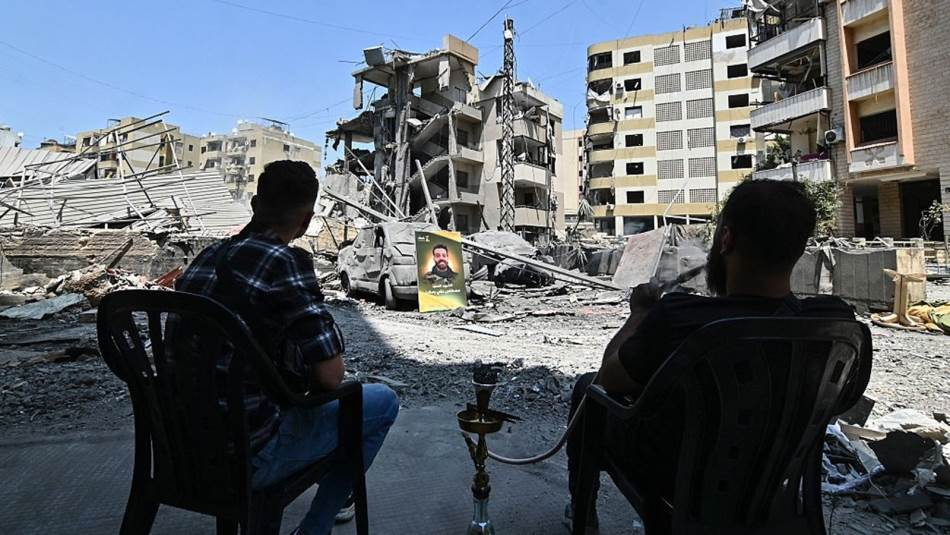Lebanese Media Turns National Failures into Myths of Triumph, Confusing Devastation with False Glory
Two men smoking hookah in front of rubble at the site of an overnight Israeli airstrike in the Kafaat neighborhood of Beirut, photographed by Fadel Itani/Getty Images.
Marwan Harb’s "We Do Not Live in Tragedy, We Live From It"* presents a multi-layered thesis that combines culture, psychology, and politics. In his essay published in Al Modon, Harb explores how tragedy is transformed into art, humor, and ritual, for "the Lebanese transform tragedy into the essence of their existence: Instead of living in tragedy, they draw life from it."
This phenomenon is evident across social media. "We recycle tragedy into songs, turn catastrophe into a joke, turn tragedy into a sarcastic post, and ruins into a poetic image — like someone building a monument from their wreckage, only to bow before it every morning,” he writes. “Catastrophe is not an event we fear, but a ritual we practice. We suffocate, but with elegance. We hate our reality, yet we long for it. We emigrate in an escape, only to return in the summer to re-consecrate the ruins in the form of a festival."
Harb explores the various ways the Lebanese people cope with the catastrophe, either by internalizing or normalizing it. Philosophers like Albert Camus, Emil Cioran, and Slavoj Žižek, whom the author cites, have warned that the real danger lies not just in adapting to suffering, but in surviving within it. This adaptation has significant consequences, including loss, illusion, and displacement. Furthermore, acclimating to catastrophe subtly undermines the self, evolving into a cultural and political endeavor that permeates identity and collective imagination. As the author perceptively states, "With our chronic insistence on 'seeing the light at the end of the tunnel,' we build the tunnel itself."
Sadly, Lebanese behavior and responses to tragedy often lack emotional maturity. In this case, maturity can become counterproductive if it encourages passive acceptance of systemic issues, hindering deeper engagement and the challenge of those structures. True emotional maturity, however, entails engaging with tragedy through art and humor in ways that reflect a nuanced understanding of complex emotions and experiences. This is a standard that the Lebanese response does not meet.
Lebanese people take pride in enduring harsh conditions, which paradoxically makes these conditions seem acceptable. This creates a dual mindset of contempt for reality and nostalgia for it. For example, power outages have shifted from being a scandal to a regular part of life, resulting in a belief that the state doesn't need to provide electricity and that citizens have no right to demand it. People may despise their circumstances yet accept or even romanticize them as necessary for survival. The phrase "contempt for reality and implicit nostalgia for it" captures this paradox, where individuals reject their harsh realities while feeling a sense of longing or attachment to them.
The Lebanese media has failed to assist the public in navigating the catastrophe, instead perpetuating stagnation by romanticizing resilience and failure. Rather than fostering meaningful change or accountability, the press normalizes disaster and glorifies individual heroism. This approach has immediate drawbacks: it normalizes disaster, diverts attention from accountability, and perpetuates a cycle of stagnation. By glorifying myths of 'Lebanese exceptionalism' and individual efforts, the media promotes a culture that celebrates chaos without achieving meaningful collective progress. This mythology, centered on the idea of the 'Lebanese who always rise,' glorifies chaotic, uncoordinated efforts that lack cumulative impact, creating a perpetual loop of resilience without fundamental change.
The central idea of the author is that symbolic tools, such as festivals, celebrations, and the return of expatriates, while seemingly positive, perpetuate Lebanon's crisis by masking its severity, delaying necessary action, and serving as a collective anesthetic that prolongs systemic collapse. Festivals and the influx of expatriates contribute to this crisis by functioning as distractions that obscure its seriousness and postpone essential measures. While these events provide temporary emotional relief and foster resilience, they ultimately act as a collective anesthetic, extending systemic collapse instead of confronting it. The author critiques how symbolic tools, like festivals and celebrations, intended to evoke joy and resilience, inadvertently perpetuate the crisis by masking its severity and delaying action. These events serve as distractions, offering fleeting emotional comfort while facilitating ongoing collapse. Beyond the media, other symbolic tools continue to exacerbate the crisis: tourist festivals, the return of expatriates, seasonal celebrations, and the mantra of "Lebanese joy despite everything." Every summer, thousands of Lebanese return from abroad, celebrated as though it were a miracle. Festivals are held in areas without electricity or water, where people sing songs of joy amid devastation. These rituals, despite their apparent warmth, have become symbolic oxygen for the crisis — a collective anesthetic that prolongs the collapse rather than severing its limbs.
The author critiques how society glorifies survival amid adversity, normalizing hardship rather than addressing its root causes. Narratives like "celebrating resilience" and "living despite everything" perpetuate an emotional reliance on failure and discourage the pursuit of systemic solutions. Celebrations and festivals mask systemic problems. For example, tourism and the "season" ritualize denial, hindering acknowledgment of crumbling infrastructure and societal struggles. These illusions consume happiness while avoiding systemic failure. The Lebanese value their wounds more than their salvation, making them a core part of their identity. This emotional system, built on endurance and satire, reflects a preference for survival over progress. This raises the central question: Why do Lebanese people love their wounds more than their salvation?
*Marwan Harb’s essay, "We Do Not Live in Tragedy, We Live From It," was published in Arabic in Al Modon.
This article appeared in Inside Al Jadid Reports, No. 126, 2025.
Copyright © 2025 AL JADID MAGAZINE

